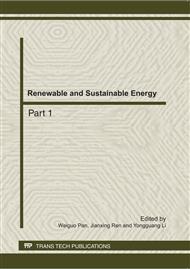p.750
p.759
p.763
p.770
p.774
p.781
p.786
p.791
p.795
Running Strategy Optimization of Micro-Cogeneration System in Residential Building
Abstract:
This paper optimizes the running strategy of residential cogeneration system, through discussing the introduction effect of a hypothetical cogeneration system for a detached house. Based on the seasonally electricity and thermal load characteristics, several annual running strategies were set considering the cogeneration equipment’s efficiency (electricity generation and thermal recover efficiencies). By simulating hourly operation condition, the yearly energy consumption, CO2 emission and energy cost were discussed. Then, the effect of running strategy were evaluated in the view of energy saving, energy cost and environmental effects. Analysis results is that the optimal running strategy is different for different co-generation equipment’s efficiency, and then the running strategy design should considering not only energy demand but also the equipment’s efficiency performance for residential cogeneration system.
Info:
Periodical:
Pages:
774-780
Citation:
Online since:
October 2011
Authors:
Price:
Сopyright:
© 2012 Trans Tech Publications Ltd. All Rights Reserved
Share:
Citation:


